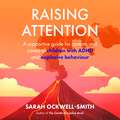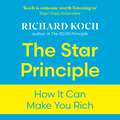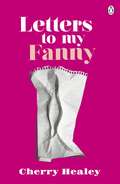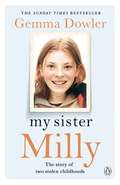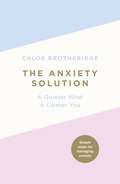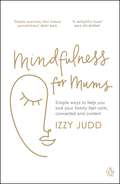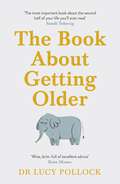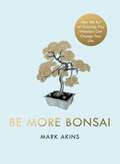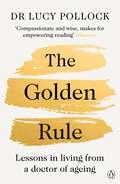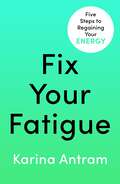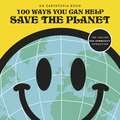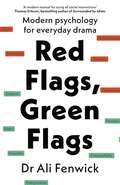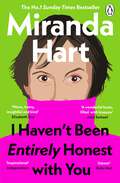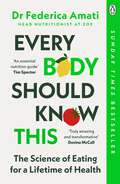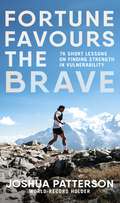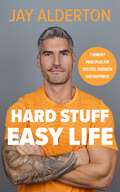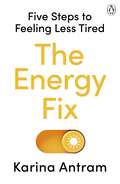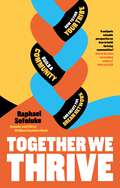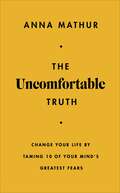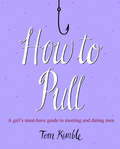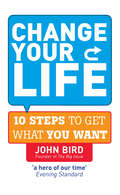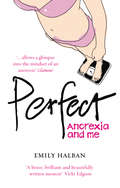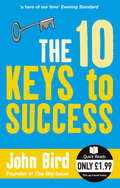- Table View
- List View
Raising Attention: A supportive guide for parents and carers of children with ADHD and explosive behaviour
by Sarah Ockwell-SmithA book for anybody who has, or works with, children (of any age) with 'out of control' behaviour, including parents, teachers and healthcare professionals. Raising Attention busts commonly believed myths surrounding ADHD and 'naughty' children, discusses up to date neuroscience and genetics research in an accessible way and provides practical tips that really make a difference to both children and the adults who care for them.Written by bestselling childcare expert Sarah Ockwell-Smith, herself a mother of a young adult with ADHD, there are plenty of heartwarming and heartbreaking personal stories included to bring the book to life.If you've ever felt exhausted, helpless, guilty, embarrassed or shamed for your child's behaviour, this supportive and non-judgemental book is for you.
The Star Principle: How it can make you rich
by Richard KochRichard Koch has made over £100 million from spotting 'Star' businesses. In his new book, he shares the secrets of his success - and shows how you too can identify and enrich yourself from 'Stars'. Star businesses are ventures operating in a high-growth sector - and are the leaders in their niche of the market. Stars are rare. But with the help of this book and a little patience, you can find one, or create one yourself.THE STAR PRINCIPLE is a vital book for any budding entrepreneur or investor (of grand or modest means). It is also invaluable for any ambitious employee who realises the benefits of working for a Star venture - real responsibility, fast personal development, better pay, great bonuses and valuable share options.Whoever your are, identifying and investing in Stars will make your life much sweeter and richer in every way.
Letters to my Fanny
by Cherry HealeyHow much more fun in life could I have had if I'd just stopped worrying so much and stopped beating myself up?In this book, Cherry reveals the things she wishes her mother had told her, through a series of hilarious anecdotes and excruciating confessions.Each chapter opens with a letter to a different body part: 'Letters to my Fanny' covers sex, orgasms and periods; 'Letters to my Brain' covers education, memory and media; 'Letters to my Tummy' covers crop-tops, pregnancy and sit-ups.This wonderfully warm, funny and candid book is a collection of hopeful dispatches from the frontline of girlhood - an impassioned plea to stop piling pressure on girls and young women and allow them to get on with their lives without having to mind the thigh gap . . .
Love, Tanya
by Tanya BurrLove, Tanya is the first book from YouTube sensation Tanya Burr.Hi everyone and welcome to Love, Tanya! This book is really close to my heart, because it's inspired by my journey to becoming confident and feeling happy about who I am. I wanted to write a book to share the things I've learnt with you - to reveal my top tips on fashion, beauty, love, friendship, YouTube... and loads more! Plus, there is room for you to list your own hopes and dreams alongside mine - so get creative and get involved! I'd love it if this book became a keepsake you can turn to whenever you need some guidance or a little pick me up. I hope you enjoy it!Love, Tanya
My Sister Milly
by Gemma DowlerYou've seen Manhunt, now read this powerful and personal account from Milly Dowler's sister Gemma . . . 'My name is Gemma Dowler. On 21 March 2002, a serial killer named Levi Bellfield stole my sister and sent our family to hell . . .'In My Sister Milly, Gemma Dowler recounts the terrible day of Milly's disappearance, the suspicions that fell on the family, the torture of encountering the murderer in court, the fatal errors made by the police, how it very nearly destroyed her family and how love and hope helped the family survive.Everyone thinks they know the story of Milly Dowler, but only one person knows the true pain of having lost her sister, and how a family can rediscover hope to survive.________________'Compelling. An amazing book'Jeremy Vine, BBC Radio 2'Heartbreaking' Daily Mail'Tragic, poignant, full of emotional memories'Daily Mirror
Hygge: The Danish Art of Happiness
by Marie Tourell SøderbergBring Hygge into your home this year with this beautiful and essential guide to the globally celebrated Danish art of happiness 'At these times it is crucial for me to have hygge. Hygge time with family and friends, hygge moments with myself and a hyggelig home.It's small moments that money cannot buy you, finding the magic in the ordinary.'_______Whether it's listening to the rain with a cup of tea, or going on a long walk with a loved one, hygge can be harnessed all around us.We all know the feeling of hygge instinctively, but few of us ever manage to capture it for more than a moment.Now Danish actress and hygge aficionado Marie Tourell Søderberg has travelled the length and breadth of her home country to create the perfect guide to cooking, decorating and enjoying yourself, inspired the hygge way.Full of beautiful photographs and simple, practical steps and ideas to make your home comforting and content, this book is the easy way to introduce hygge into your life.'Pretty, homey and intimate, scattered with reflections from ordinary Danes' GUARDIAN
The Anxiety Solution: A Quieter Mind, a Calmer You
by Chloe BrotheridgeFind your fresh start by learning how to cope with anxiety and become a calmer, happier and more grounded person with this simple and accessible guide'Remarkable, pioneering, could change your life' Daily Mail_______This is a book for anyone experiencing anxiety, guiding you through simple ways to ease panic, dread and fear in the uncertainty of modern life.The Anxiety Solution is a simple and inspiring guide to reducing anxiety from former sufferer and qualified clinical hypnotherapist, and host of The Calmer You podcast, Chloe Brotheridge.Chloe will help you understand why we feel anxious and will equip you with techniques to help manage the symptoms and start living a happier, more confident life.Based on the latest scientific research and her unique programme which has already helped hundreds of clients, The Anxiety Solution will show you how to regain control of your life.'I know what it's like to be stuck in a cycle of anxiety. I used to feel as though fear and worry were a permanent part of who I was . . . but I'm here to tell you that it doesn't have to be this way. The truth is, your natural state is one of calmness and confidence - and I'm going to teach you how to get there.'If you want to spend less time worrying, this book is the solution for you. You'll be surprised how quickly you can be back in control and able to enjoy your life once again._______Discover the impact The Anxiety Solution has had on readers:'As an anxiety sufferer who has tried medication and counselling I never truly felt that anyone understood exactly what I was feeling . . . until I ordered this book! It has changed the way I look at life, and I wish I'd have found it sooner' 5***** Reader Review'Inspiring, educational and informative. If you are somebody looking for solutions to your health, wellbeing and happiness, this book is for you. Could not recommend highly enough' 5***** Reader Review'Putting into practice what is written in this book has made me one million times more positive in my thinking than I ever was' 5***** Reader Review'Chloe offers realistic advice and methods that have helped me to co-exist with my anxiety in a way I never thought I could' 5***** Reader Review
Mindfulness for Mums: Simple ways to help you and your family feel calm, connected and content
by Izzy JuddHelp Mum to destress with this beautiful collection of exercises for maintaining a happy mind'Delightful. Provides simple, easy and fun activities for both parents and children of all ages to restore calm and peace' MAIL ON SUNDAY ______ Being a mum is often anything but mindful.Having suffered from anxiety for much of her life, Izzy Judd has brought together a brilliant and inspiring collection of simple activities and exercises to help parents find their own piece of calm. Included are exercises both for you to do alone and with your children of all ages, giving them their own tools to help remain happy and peaceful too. Inside you'll discover: · Ways of bringing mindfulness to your day · Your own self-care routine · Breathing exercises to do with children · How to prepare for a good night's sleep · One-minute mindfulness Izzy Judd's beautiful and practical book will hold your hand through the challenging and exhausting days as well as the exciting and happy days.Most importantly, it will help you to create special memories for you to share with your children.
The Book About Getting Older: The essential comforting guide to ageing with wise advice for the highs and lows
by Lucy PollockThe honest, compassionate and vital guide to getting older, from dementia to finances, medication to care homes'The most important book about the second half of your life you'll ever read. I wish everyone in the UK could be under Dr Lucy's care' SANDI TOKSVIG'This warm and compassionate book gets to the heart of older age' THE BRITISH GERIATRICS SOCIETY________Now more than ever, we need to talk about getting older.Many of us are living to a very great age. But how do we give those we love, and eventually ourselves, long lives that are as happy and healthy as possible?Dr Lucy's book gives us answers to the questions we can voice - and those that we can't. This essential guide will guide you through those important conversations around growing older, answering every question you might have, including:· How do we start the conversation?· How do we ask whether it's worth taking seven different medicines?· Is it normal to find you're falling out of love with someone, as they disappear into dementia?· Should Dad be driving, and if not, who can stop him?· What are the secrets of the best care homes?· When does fierce independence become bad behaviour?· How do you navigate near-impossible discussions around resuscitation and intensity of treatments?· And who decides what happens when we become ill?Serious, funny, kind and knowledgeable, this readable book helps guide us through essential conversations about getting older that go straight to the heart of what matters most.
Be More Bonsai: Change your life with the mindful practice of growing bonsai trees
by Mark AkinsCultivate a mindful new habit in 2023 with Be More Bonsai, and discover how the art of growing bonsai trees can lead to a happier, more mindful way of lifeAmid the chaos of modern life, the ancient art of tending to bonsai can bring calm and perspective.The central tenets of this beautiful, meditative practice teach us patience, focus, calmness, perspective, planning, mindfulness and many more traits that can help us in our busy, challenging everyday lives.This calming companion will guide you through:· Caring for your own bonsai tree· Applying the mindfulness of cultivating bonsai to everyday life· The ancient Eastern philosophy of tending to bonsaiFrom the shedding of leaves representing the letting go of material possessions, to carefully tending to the bonsai roots just as we should our own core values, Be More Bonsai is filled with wisdom that you'll cherish every day.Through the pages of this unique book, drawing on thousands of years of wisdom, elegant philosophy and a simpler, ancient way of life, we can all learn to Be More Bonsai.
The Golden Rule: A Compassionate Guide to Ageing Well, Caring for Loved Ones and Living Later Life with Confidence
by Lucy PollockA new way to think about ageing - for ourselves and the people we love. With warmth and wisdom, geriatrician Dr Lucy Pollock shows us how'The Golden Rule is part manifesto for better integration and appreciation between generations, and part reflection on a career spent looking after our elders, [. . .] with good humour, sanity, wisdom and quite a few jokes' The Times__Plan A: stay young foreverPlan B: read this bookToday, we are living longer lives and have choices now as never before about how we will age.What will make us happy?What frightens us, and what might allay our fears?What changes, made right now, will help us to flourish?In The Golden Rule, Dr Lucy Pollock shares lessons she has learned in the thirty years of working with older people and their family and friends.She explores problems that can be fixed with tests and tablets, and problems that require a different sort of medicine.These engrossing stories explain what she has been taught about impossible families, important decisions, becoming older without children, sexuality, race, love, and living with uncertainty.--'From the first pages, the impression you have is how much you’d want Pollock as your medical practitioner. . . this warm and compassionate book is part reflection, part rallying cry to set in place a better society for older people' Daily Mail'Beautiful and wise, filled with characters I know living through situations I recognise, filtered through the kindness of thoughtful storytelling' Kathryn Mannix, author of With the End in Mind
Fix Your Fatigue: 5 Steps to Regaining Your Energy
by Karina AntramLearn how to never feel tired again with the life-saving toolkit to regaining your energy and finding happiness - the book everyone NEEDS in 2023'It's a cracking book, a cracking, cracking book' CHRIS EVANS, Virgin Radio'This practical five-step guide to tackling tiredness combines coaching-based methodologies, useful reflections, tips and lifestyle changes' Your Healthy Living'Simple tips to boost your energy levels' THE TIMES___________It isn't normal to feel tired all the time.In fact, tiredness is one of your body's key ways of telling you that something isn't right, but many of us trudge through life feeling some level of fatigue or lethargy every single day.Registered nutritionist and executive coach Karina Antram will help you to identify and understand these symptoms and their causes, as well as providing the tools to reclaim the energy that is so fundamental to health, happiness and mental wellbeing.Fix Your Fatigue will lead you through these five simple and achievable steps . . .1. Fuel your body2. Support your gut3. Supercharge your sleep and exercise4. Energise with supplements5. Harness the power of your brain. . . to reinvigorate and stabilise your energy levels.
100 Ways You Can Help Save The Planet: Packed to the brim with tips on saving the planet in easy and accessible ways
by EarthtopiaPopular climate change TikTok sensation, Earthtopia, brings a book packed to the brim with tips on saving the planet in easy and accessible ways.Want to save the planet? Start here.Earthtopia is here to teach you the little things you can do that make a huge difference to our planet.Things like:- Ditching fast fashion- Making your school plastic-free- Learning to fix your belongings- Using reef safe sunscreen- Getting involved in political change- And . . . bamboo-ing your poo?!With these and 100 other tips that make a massive impact, Earthtopia is here to help you live your best life - without costing the earth.
Red Flags, Green Flags: Modern Psychology for Everyday Drama
by Dr Ali Fenwick‘A MODERN MANUAL FOR ACING ALL SOCIAL INTERACTIONS THAT WILL TEACH YOU HOW TO HANDLE THE TRICKIEST OF PEOPLE AND SITUATIONS' THOMAS ERIKSON, BESTSELLING AUTHOR OF SURROUNDED BY IDIOTS Discover the tools to identify healthy and toxic behaviours in all areas of life and separate the red flags from the green, from TikTok psychologist Dr Ali Fenwick---CRACK THE BEHAVIOURAL CODE BEHIND EVERYDAY DRAMAIs there a situation(ship) you can’t find your way out of?Do you wish you could spot toxic friendships from afar?Or maybe you feel like you’ve had enough of some people, but struggle to set boundaries?From gaslighting crushes and pushy parents to bosses that take credit for your work, Red Flags, Green Flags will transform how you interpret and handle any situation, leading you straight into a fuss-free existence.An internationally renowned psychologist and behavioural expert Dr Ali Fenwick is here to guide you through the most crucial red and green flags – unhealthy and healthy social conduct – and equip you with the psychological explanation behind each one. Improve your emotional intelligence and learn how to understand your own needs and expectations when it comes to relationship building.
I Haven’t Been Entirely Honest with You: From bestselling author and the nation's favourite comedian
by Miranda HartPacked with hard-won wisdoms and gentle truths, this is Miranda’s honest exploration of the lessons she has learned on her journey from illness to recovery'A bombshell, moving, inspirational. Hart passes on the tips that helped her emerge from psychological as much as physical doldrums. No comedian, female or male, has been so taken to the nation’s bosom since Victoria Wood' Independent'Irrepressible and joyous. Taking us affectionately by the hand, Miranda takes us through her ten-year journey to deep self-knowledge' Daily Mail‘A wonderful book, filled with treasure’ Julia Samuel'A raw and poignant account. Miranda is more of an everywoman than ever before' The Times'Miranda's account of slowly letting her guard down and being vulnerable is sweet and moving, and proof that happiness is possible even in the most trying times' Guardian----Hello to you, I am with news. I have a new book: I Haven’t Been Entirely Honest With You. I know – what an intriguing title!Basically, I have had an unexpectedly difficult decade – there have been surprising joys, but also deep revelations and challenging lows. I shall be honest about those, because what I discovered in the difficult times were my, what I call, treasures.Treasures – practical tools, values, ways, answers researched from some great scientists, neuroscientists, therapists, sociologists (all the ‘ists’) out there, that have genuinely led to a sense of freedom, joy, peace and physical recovery I never would have thought possible.Life now, amazingly, with what I will share, is – SUCH FUN! (always important to quote your own catch phrases. . .) If you fancy having a read, then I hope my story might help your story. After all, we are in this beautiful, mysterious, challenging life together. Rest assured there are funny stories along the way – we will have a laugh too, my dear reader chum.Oh, and I couldn’t possibly say if there is a love story in it . . . (There is – shush). Exciting.----Sunday Times bestseller, October 2024
Every Body Should Know This: The Science of Eating for a Lifetime of Health (From Medical Scientist and Head Nutritionist at ZOE)
by Dr Federica Amati***AS SEEN ON THIS MORNING***CHANGE YOUR APPROACH TO EATING IN 2025 FOR A LIFETIME OF HEALTH‘An essential nutrition and lifestyle guide across the lifespan. A fascinating DIY guide to food and health – read it!’ Dr Tim Spector, author of Spoon Fed and Food for Life‘This book contains the most critical answers to nutrition that we’ve all been searching for. A must read’ Steven Bartlett'Truly amazing and completely transformative’ Davina McCall----A SCIENCE-BACKED NUTRITION GUIDE FOR ALL LIFE STAGESIn Every Body Should Know This, medical scientist and Head Nutritionist at ZOE, Dr Federica Amati explores the real science behind nutrition. By following her advice, you will learn how to eat for best health at each life stage and discover what every body should know, such as . . .- The truth surrounding superfoods and ultra-processed foods- Why nutrition plays a crucial role from before conception to senior years- How food choices can support longevity- Targeted tips for good health at each life stageWith this book, you will gain insights into what foods work for the bodies and minds of you and your loved ones, and implement clear, nutritional strategies backed by the latest scientific research for men, women and children.Because when it comes to food, one size does not fit all.----'A definitive guide on not just what to eat, but when and why' Daily Telegraph'So good, so informative. There's so much incredible stuff in here' Cat Deeley and Ben Shepherd, This Morning‘An easy to implement and practical guide to nutritional science!’ Dr Karan Rajan, author of This Book Will Save Your Life‘Federica offers a novel framework for thinking about nutrition and points to the lifestyle factors that do make a difference in protecting and enhancing our long-term health. This is a book you shouldn’t miss’ Dr Sarah Berry
Fortune Favours the Brave: 76 Short Lessons on Finding Strength in Vulnerability
by Joshua PattersonWhether you are struggling with self-doubt or lacking purpose, these 76 short motivational lessons from the multiple world-record holder, Josh Patterson, will give you the boost you need.When Josh set out to break the world record and run 76 marathons around the UK’s 76 cities in 76 days he knew it would be a test of determination and resilience, but he hadn't realised that his past struggles would provide the real strength he needed to cross the finish line. Having suffered with depression and come close to suicide in the past, Josh ran to raise money for the Samaritans and as he ran through the wind and rain, sometimes with crowds of supporters, sometimes alone, he often drew upon the memories of his darkest days to spur him on, knowing that there were happier times ahead. This is a collection of the 76 powerful lessons that fuelled Josh to reach the finish line – and will inspire you to reach yours, whatever that might look like – including:Memories are motivationThere is no such thing as failure, only a lesson to be learnedDon’t be too proud to ask for helpLook at how far you’ve comeFocus on progress over perfectionYour thoughts don’t define you This isn't a book about running, it is about how to find light in the dark and rise from the ashes, and how to find the strength to achieve whatever you put your mind to.
Hard Stuff, Easy Life: 7 Mindset Principles for Success, Strength and Happiness
by Jay AldertonIN A WORLD WHERE COMFORT AND CONVENIENCE OFTEN RULE, DISCOVER THE 7 MINDSET PRINCIPLES THAT ARE THE SECRET TO A FULFILLING LIFE ----EVERY TRANSFORMATION STARTS FROM THE NECK UPAre you tired of never getting what you want?Is convenience preventing you from achieving your goals?Do you crave an easier, more meaningful life?An ex-military and a transformation coach, Jay Alderton reveals the game-changing truth: the secret to an easy life is conquering the hard stuff, and the hard stuff is all in your head. Because every great transformation starts from the neck up, all you need to do is learn how to crack the mindset code to make the hard stuff very easy.By breaking down the seven key mindset principles for success, strength and happiness, Hard Stuff, Easy Life will equip you with the tools to overcome any obstacle . . . 1. Happiness Is an Inside Job2. Make Peace with Your Past3. Stay True to Yourself4. Get Over What Other People Think5. Focus on the Big Picture6. Embrace Obstacles7. Stay PresentOne of the most valuable and frequently overlooked lessons of all is that about staying present in the moment. This is how you not only build a life you want, but live it to the fullest, too.Whether you're aiming to conquer personal goals, get rich and successful, or thrive in your personal life, this book is your compass and guide towards what can be your easy life of fulfilment, abundance, and jaw-dropping achievements. It’s your new revolutionary guide that will transform your life, starting from the neck up.CRACK THE MINDSET CODE AND START LIVING YOUR BEST LIFE
The Energy Fix: Five Steps to Feeling Less Tired
by Karina AntramFeeling tired but don't know why? This is the book anyone battling low energy needs to read.'It's a cracking book, a cracking, cracking book' Chris Evans, Virgin Radio The Energy Fix is a nutritional science book that will help you to understand why your energy levels are so low and equip you with easy, practical, everyday strategies for boosting it. Drawing on scientific research and the author’s nutritional expertise, this simple five-step approach shows how to reinvigorate and stabilise your energy levels for good: 1. Fuel your body 2. Nourish your gut 3. Supercharge your sleep and exercise 4. Power up with supplements 5. Harness the power of your mindWith The Energy Fix you can learn how to listen and respond to your body so that you never feel tired again.'This practical five-step guide to tackling tiredness combines coaching-based methodologies, useful reflections, tips and lifestyle changes' Your Healthy Living'Simple tips to boost your energy levels' The Times*Previously published as Fix Your Fatigue*
Together We Thrive: How to find your tribe, build a community and create the dream network
by Raphael Sofoluke‘Raphael has an experience few can equal. His book offers a uniquely valuable perspective on how to build thriving communities!’ Steven Bartlett, bestselling author of Diary of a CEOWe live in a world of individualism, where people act in their own interests, striving for their own success. Our focus on self-development means we’ve overlooked a vital and transformative power.In Together We Thrive, Raphael Sofoluke, Founder and CEO behind UK Black Business Show and UK Black Business Week, reveals the immense potential of harnessing a community.You’ll learn how to nurture the connections that will become your currency and build relationships that will fuel your success. Your network speaks louder than you can, amplifies your story, mission and values, and is more resilient than you could ever be on your own. Packed with insights and inspiration from Sofoluke and his own community of highly successful people, Together We Thrive will help you find a tribe of invaluable supporters who will hold you to account and make sure that you reach your full potential.If you want to go far, you have to go together.
The Uncomfortable Truth: Change Your Life By Taming 10 of Your Mind's Greatest Fears
by Anna Mathur'Gently challenging, deeply empowering,' Julia Samuel, Sunday Times bestselling author of This Too Shall Pass"Some people don’t like me”“Bad things will happen to people I love”“I’m going to fail”… these words underpinned my anxieties and nightmares. I bet they feature in yours too.Our fears are anchored in the unavoidable truths of life; all things reach an end, bad things happen, and we lack the control we crave.As an experienced psychotherapist, who’s had years of therapy, I realised that ploughing endless energy into trying to control the uncontrollable is keeping us all tired, wired, and worried. Ignoring fears doesn’t make them less true, it makes them more powerful. I decided to try a different tact and it changed my world.Instead of doing everything I could to ease and avoid life’s uncomfortable truths, I sought a deeper acceptance of them. Through using this approach, my clients and I discovered that fear began to loosen its grip. We were living more intentionally and peacefully.So, face your fears one chapter at a time, and discover who you are without worry, doubt and people-pleasing holding you back.
How to Pull: A girl's must-have guide to meeting and dating men
by Tom KimbleMost single girls will tell you that meeting and dating men is a minefield. Yet so many relationship books tell girls the things they don't want to hear (why all men are scoundrels) as opposed to what they really want to know - how to navigate that minefield to meet, date and ultimately bag, the man of their dreams.How to Pull fills that gap in the relationship book market. It's packed with all the essentials from how to hook him with that first look, to dating scenarios, moving in for the kill, playing the texting or email game and what to wear on a first date. What's more, it's written by a man and by allowing girls to understand how an insider thinks, it answers all the questions they agonise over: how long should you wait to return his text, does it pay to seem busy or desired by other men and what does he want his friends to think when they meet you. How to Pull is a fun, indispensable guide to finding (and keeping) a man that all single girls will be desperate to get their hands on.
Change Your Life: 10 steps to get what you want
by John BirdIf you wanted to be a successful chef you would read Gordon Ramsay's autobiography. He tells you how he became the successful cook and businessman he is today. His book provides you with a model of how he did it. Allen Carr's book does the same. It tells how he became a world-renowned therapist, helping millions of people to give up smoking. Change Your Life is for everyone else. Those who have the best will in the world, but never get round to using it. Those who start something, but don't finish it. Those who fail, and then fail again.Drawing on John Bird's own life experiences, this book outlines the mistakes he has made and the subsequent lessons he has learned along the way. Change Your Life is about getting lost, feeling self-pity, feeling a failure, disliking the world and oneself; and then climbing out of it. John Bird will teach you how to be a success.
Perfect: Anorexia and me
by Emily HalbanEmily Halban developed anorexia in her final year at school. She went on to university at Oxford where her disease took on a powerful dimension and by her final year she was so debilitated that she had to sit her exams in a separate room where she could be fed continuously throughout each one. With heartbreaking candour and poignant intimacy, Emily vividly chronicles the complexities and inner struggles of living with anorexia. Two years on, she traces her disease from its elusive origins, through its darkest moments of deprivation, guilt and self-loathing, and finally recounts her journey towards recovery. Emily allows us to understand what it's really like to suffer from anorexia, exposing its secrets and dispelling some of the myths that shroud it. Alive with self-awareness, but never self-pity, Perfect is an inspiring read that will help those battling with the horrors of anorexia find a way out, and those on the outside to understand more.
The 10 Keys to Success
by John BirdIn his inimitable no-nonsense style, John Bird - founder of the Big Issue - shows us how to be successful in whatever we choose in just ten easy steps.No one is born deserving anything - you only deserve what you achieve by yourself. Drawing from this, John's philosophy is based on the idea that success is about deciding what you want, working out what is important to you and then going out to grab it. The beauty of this approach is that we can all achieve whatever we want; we just need to go after it. With unique lessons such as 'Don't be afraid to make mistakes along the way. Instead, make mistakes and learn from them' and 'Take responsibility for yourself as you are no one else's problem', The 10 Keys to Success shows us how uncomplicated success can be.
